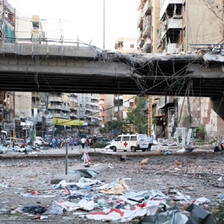Saida 17 July 2006

Destruction in the Bir el-Abed area of the southern Beirut suburbs after bearing the brunt of an Israeli air strike. Photo taken 16 July 2006. (IRIN/Leila Hatoum)
As I write this message, the southern suburbs of Beirut are still under attack with air raids from Israeli warplanes and villages in the south on the border are all under heavy artillery. Tens of buildings of eight and ten story height are all leveled to the floor. The aim is to empty the area of any inhabitants and supposedly be able to isolate the resistance fighters. In Beirut, they bombed the port once again targeting the wheat containers also killing on individual.
In the Beqaa they bombed a plant of dairy products called Liban Lait, a gas station, and a school. In Riyaq, also in the Biqaa, they targeted a house where internally displaced peoples (IDP) had found refuge and killed the whole family. The Biqaa city of Chtoura was also targeted.
Near Beirut, an object was burning and went down from the skies. There were many reports indicating that it could have been a plane or something of the sort that was shot down. There was speculation that this was a balloon for monitoring (they had these all over the southern border to watch what is going on in Lebanon on a regular basis) or else an extra fuel tank.
In and around Tripoli (Al-Abdeh) they bombed an army base killing five. By the way, the Lebanese army has not been responding to any shooting by Israel. It seems that because Prime Minister Fouad Seniora did a call for a cease fire, we have not been hearing any of the army anti-aircraft machinery.
In the South, they targeted all the towns on the road between Saida and Beirut, by bombing further any roads and bridges that had so far been untouched. At Rmeileh bridge they bombed and killed over 14 people that were in a small bus trying to evacuate to safer areas. They also rebombed the Jieh power plant and today the plant was on fire; you can see the smoke from miles away, we can smell the smoke and breathe the burning. Early in the morning, they bombed the Ghazieh bridge and killed two people that were in car trying to leave the city. Ghazieh is a town near Saida. All these are new bridges that were built to connect the towns with the new highway.
The water tank of Said was also destroyed and two members of the army were killed at that post.
In the border towns, the Israelis continue to commit one massacre after another by killing people in their homes, or asking them to evacuate and then killing them as they try to flee to another town on roads and bridges that are half destroyed. A fire truck today was also destroyed. The border towns are sending rescue signals via the local television station reporters, who are jumping over all sorts of barriers to report to us what is happening. People are terrified for their lives and for the lives of their loved ones. The bombs come from tanks on the border as well as airplane raids and gunboats. It comes from all directions.
Today, we drove around Saida and all public schools in Saida are filled with IDPs, people who have left with nothing but the clothes on their backs, and others that have have lost family members and homes. Today, the Israelis asked people in Nabatiyye (through pamphlets dropped from the sky) to leave. We could see trucks of the army that are bringing some food and supplies as well as foam mattresses for children and families. Others have fled to Beirut and further to Tripoli where schools are also filled with families. Yet many more are stuck in villages, under daily attack and lacking food or medicine.
In Saida, food prices have all gone up extremely high as there is a lot of demand, particularly with those displaced coming in. Gas prices are still the same for now, but gas stations are only working for few hours a day.
In Aitaroun, the local school teacher is now acting as the village doctor, performing CPR and providing medicine to the elderly with diabetes and other illnesses.
Related Links
Dr. Zeina Zaatari is an anthropologist writing from her hometown of Saida
